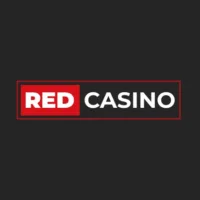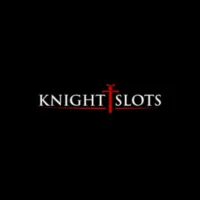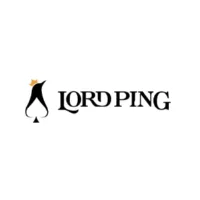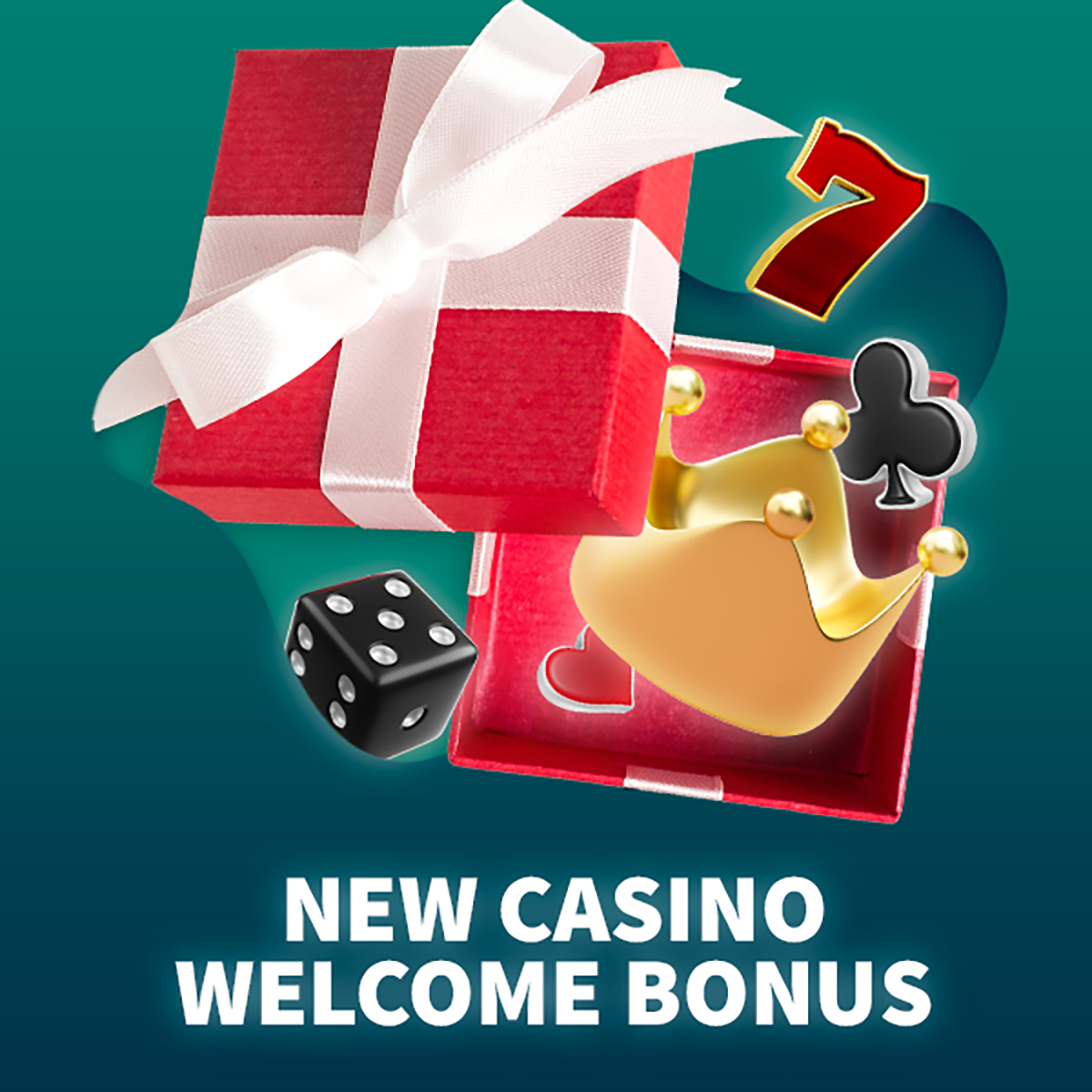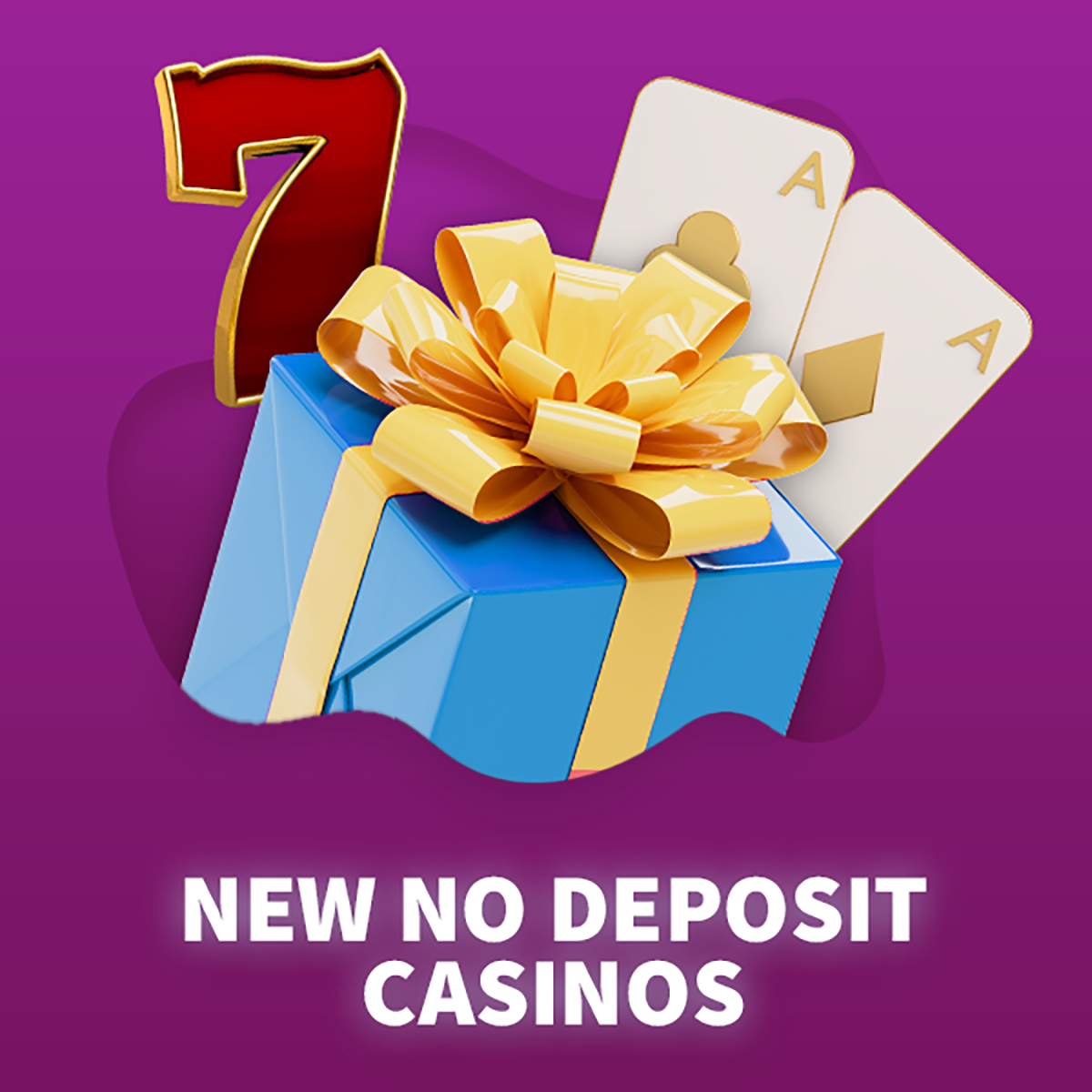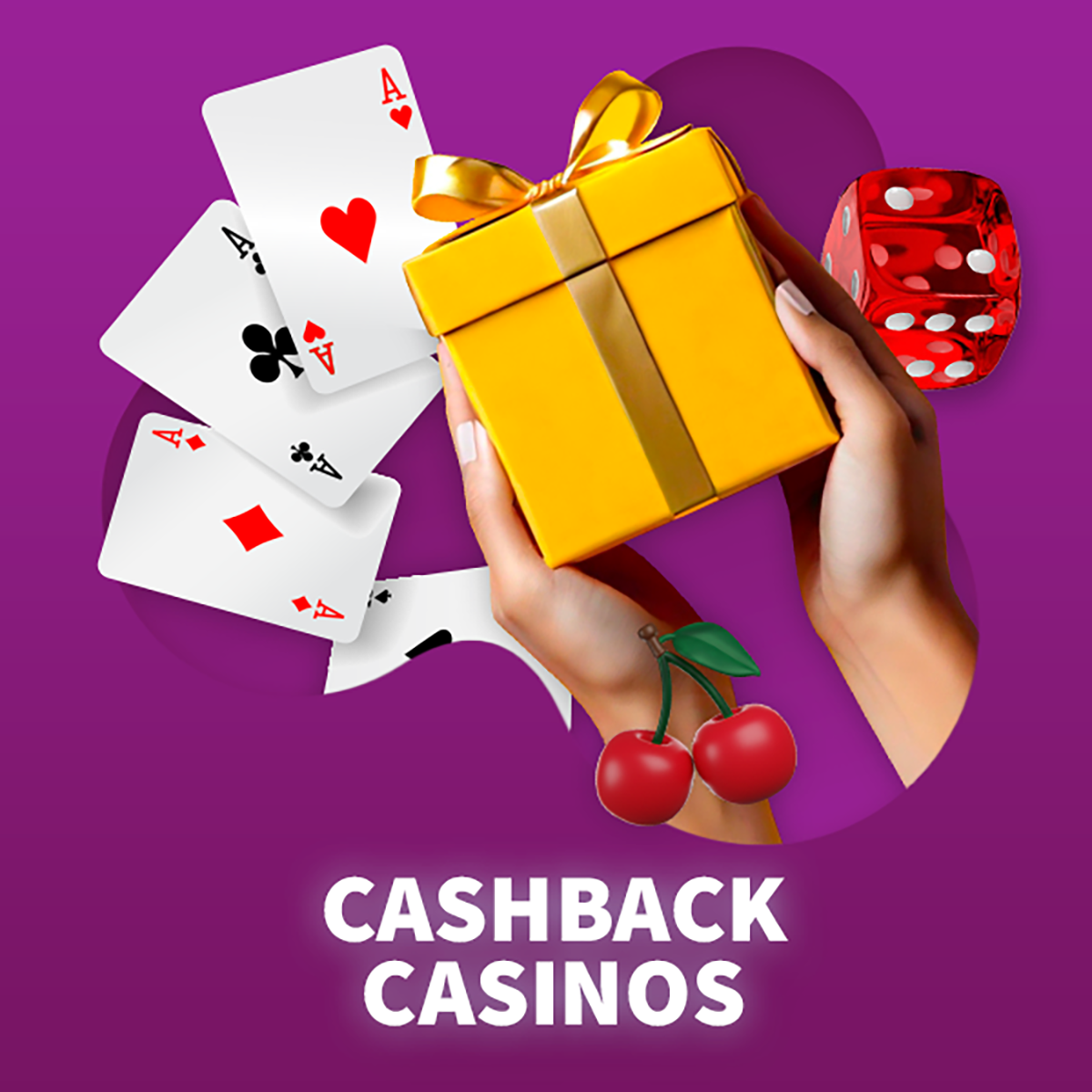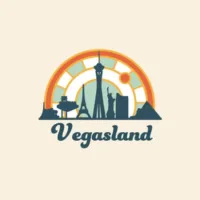
-
 Many payment methods
Many payment methods -
 Collaborates with the best software providers
Collaborates with the best software providers -
 Secured with SSL encryption
Secured with SSL encryption
-
 Mobile Casino
Mobile Casino -
 Tablegames
Tablegames -
 VIP Programme
VIP Programme
-
 VIP Programme
VIP Programme -
 Cashback
Cashback -
 20_Free_Spins
20_Free_Spins
How We Rate MGA Casinos
We take into account the following 12 factors when rating casinos licensed by the MGA:
- Regulation and licensing: We ensure that the casinos we recommend comply with MGA’s standards, guaranteeing legality and fairness. If MGA blacklists a casino for its practices, we will update our ratings accordingly and won’t recommend it anymore.
- Safety & security measures: We assess the safety tools, such as encryption and data protection, to ensure that player information is safeguarded.
- Game selection: For an enhanced player experience, we check that a diverse range of high-quality games powered by top game software providers in the industry is available for both newbies and enthusiasts.
- User experience: Easy navigation and user-friendly interfaces are key in our evaluations for a pleasant gaming session.
- Mobile-friendly: We test the accessibility of mobile devices for gaming on the go. Whether on a browser or dedicated app, all device users must be catered to with mobile-friendly games.
- Customer support: We evaluate how efficient and responsive the support team is, as it improves the casino’s reliability. If you encounter any problems, you can contact the site’s customer support – MGA casinos need to offer some form of customer support (the most popular is live chat).
- Bonuses and promotions: We examine the promotions and their value, how fair and attractive the offers are, and who these bonuses are available for. This way, we ensure that new and existing customers can benefit from these offers.
- Payout speed: We check how quickly withdrawals are carried out – fast payouts reflect positively on a casino’s efficiency.
- Payment options: We verify that various secure deposit and withdrawal methods, such as traditional options and modern e-wallets, are available. The MGA ensures that this as well in it’s regulations – casinos need to adhere to strict financial security standards so player funds and transactions are treated with safety and integrity.
- Responsible gambling tools: Features promoting player safety are important and essential for MGA casinos. The MGA dictates that their casinos have tools to foster a safe gaming environment, such as deposit limits, reality checks, and self-exclusion, in addition to providing resources for professional help and support when it comes to gambling addiction.
- Transparency and fair play: We know it’s essential to maintain fairness for the integrity of an online casino, and even the MGA enforces this through their regulations. This includes auditing casino operations, regularly testing the Random Number Generator (RNG) systems to ensure unbiased game outcomes, and monitoring compliance with fairness and player protection standards.
- Reputation: Since we aim to provide safe and secure options, we consider the casino’s reputation while looking at feedback from players – a good track record builds trust.
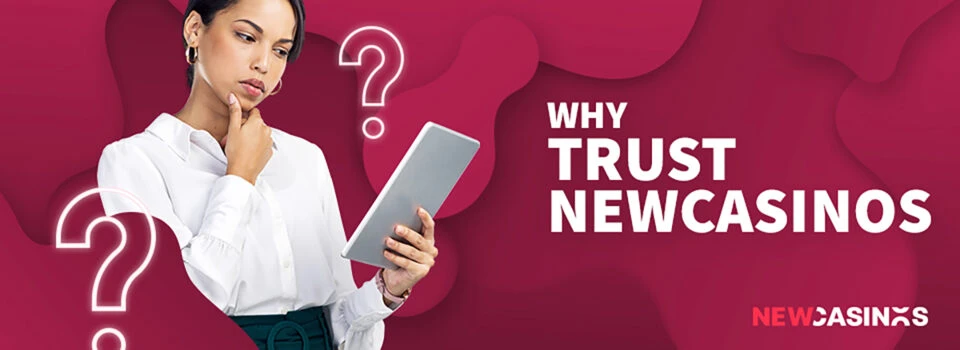
Why Trust Our Ratings?
The NewCasinos team is committed to providing accurate and unbiased information. That’s why we have dedicated significant effort and the following resources to ensure the casinos we endorse meet high standards:
- 2 experts to test new MGA casinos
- 45 hours of testing new MGA casinos
- 8 hours a month devoted to updating information
- More than 24 hours curating the MGA casino selection
At least two editors from our team review each MGA casino to guarantee our recommendations are legitimate and up to date.
What Can I Expect from MGA Casinos?
In this section, we will take a closer look at what players can expect from these casinos and cover 5 important criteria when deciding to play:
- Why play at these casinos & any downsides
- Bonuses available
- Accepted payment methods & KYC process
- Types of games & providers
- Safety & security measures

Why Play at MGA Casinos?
The 10 main benefits of playing at these casinos are:
- Strict supervision and regulation for safety and accountability
- Fair play measures
- Customer support needs to be offered
- Player funds are protected
- Wide range of high-quality games
- More appealing bonuses, including loyalty & VIP
- Responsible gambling tools with their own Unified Self Exclusion Programs
- Help from the regulator for disputes
- Uninterrupted playing on slots, as there are no spin intervals
- No limits on deposits are imposed
Are There Any Downsides?
We’ve noticed the following 4 drawbacks when it comes to playing at these casinos:
- Not part of other national self-exclusion programs
- Country restrictions: not all global players are accepted
- The range of games and bonuses offered varies significantly between casinos
- Rigorous compliance may lead to stricter KYC checks
Bonuses Available
Known for having some of the most lucrative and diverse casino bonuses, these 8 types are some of the most commonly found:
- Welcome bonuses to greet new players
- Free spins on slot games
- No deposit bonuses to test games without the financial commitment
- Loyalty & VIP programs rewarding regular and high roller play
- Referral bonuses for players who recommend a casino to their friends
- Cashbacks & reload bonuses as an offer to replenish players’ losses
- Tournaments & competitions
- Seasonal offers to celebrate special events such as Christmas

Types of Games
A broad range of casino game options are available, including the following 5 types:
- Slots: Ranging from classic slot titles to progressive jackpots and megaways.
- Table games: (blackjack, roulette, baccarat)
- Live dealer games: live dealer versions of classic table games allow players to experience the brick-and-mortar experience at home.
- Speciality and instant win games: Unique and less conventional options like Bingo, Keno, Crash Games, and Scratch Cards offer an alternative form of gameplay.
- Sports betting: from popular sports, including football and horse racing, to more niche options, such as virtual sports and even popular events like Eurovision, punters have a range of choices when it comes to betting on outcomes.
All these games mentioned come with a high RTP and are proven to be 100% fair. MGA oversees the game providers with the requirement of a B2B license that the regulator provides if they want to be displayed at these casinos. Obtaining this license ensures that games are audited by independent agencies such as eCOGRA for fairness and RTP.
Special Features for Quick Gameplay
Many modern online casino games at Malta casinos, particularly slots, incorporate smart functions for quick gameplay and an enhanced gaming experience. These features include:
- Autoplay
- Turbo spins
- Quick deposit & withdrawal options
- One-tap sports betting
- Saving user preferences such as bets and games
- Instant game loading
Both novice and experienced players looking for fast, simple, and user-friendly gaming sessions can benefit from these features. Some license providers do not allow for all these features to be implemented for fear of encouraging a gambling problem. MGA takes a different stance on this, as they base their responsible gambling practices on research, and currently, there are no studies that verify these claims.
Software Providers
13 of the most popular software providers you will find powering Malta casino sites are:
- Playtech
- Games Global
- Evolution
- Pragmatic Play
- NetEnt
- Yggdrasil
- Betsoft
- Play’n GO
- Big Time Gaming
- Red Tiger
- Relax Gaming
- No Limit City
- Push Gaming
If you can’t find any games by MGA providers, it is most likely restricted in your country.
💡Did you know? The MGA licenses about 120 software providers.
Accepted Payment Methods
The banking options accepted are practically unlimited, with the main restrictions on these being country restrictions. If players want a quick overview of the casino payment methods available, we’ve prepared a list of 8 common options:
- Visa
- Mastercard
- Bank transfer
- Trustly
- Neteller
- Skrill
- PayPal
- Cryptocurrencies particularly bitcoin
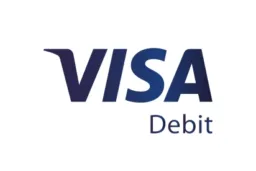
Casinos accepting Visa debit cards allow players to deposit into their account in just a few se...

MasterCard casinos are being launched all the time due to the popularity of this debit card wor...

A bank transfer is a safe bet if you’re looking for a widely accepted, easy, and safe way...

All the Trustly casino sites listed below are licensed and fully verified by our team of expert...

Neteller is one of the most recognized and solid e-wallets in the market nowadays. Today, ne......

Skrill is a popular global e-wallet and casino payment provider which offers deposit and withdr...

Verification Requirements
The MGA dictates casinos must follow strict Know Your Customer (KYC) and Anti-Money Laundering (AML) protocols. Through verification requirements, casinos can prevent potential fraud and criminal activity with the above-mentioned payment methods. If a casino doesn’t follow these frameworks for verification, they risk hefty fines and possibly revoking their license.
The casino does KYC authentication upon registration or when requesting a first withdrawal, and usually involves submitting a set of documentation to confirm your identity and source of funds. The documents required for a KYC check typically include:
- Identification documents: passport, ID card, driving license or any other picture ID
- Verification of address: a utility bill not less than 3 months old, or an official government letter; phone bills or rent contracts are usually not accepted.
- Receipt of payment: proof showing Internet banking or e-wallets (depending on the banking option chosen) showing your account information and/or transaction.
Some casino sites may let you verify documentation automatically through your bank; however, you will be asked to submit the above-mentioned documents directly to the casino. Extra verification might be necessary if the total transaction amount reaches the security limit (around €23,000/ £19,000).
Tips for KYC:
- Have documentation prepared/ readily available before playing to avoid delays
- Payments should be made using only payment methods on your name, otherwise, your casino account will be blocked
- Try different casinos; spending most of your bankroll at the same site will require you to fill out a Source of Wealth (SOW) questionnaire
Safety & Security Measures
The MGA ensures that its licensed casinos provide a controlled and safe gambling environment while still entertaining players. For casinos to guarantee integrity in their operations, the MGA oversees that stringent safety & security measures are imposed by:
- Implementing strict data protection measures to safeguard personal information, such as two-factor authentication (2FA)
- Enforcing fair play with independent game testing and certification
- Ensuring the use of secure banking options by working with reputable providers
- Protecting players’ funds by requiring casinos to keep them separate from their funds
- Rigorous process to confirm identities, prevent underage gambling & potential criminal activity
- Responsible gambling tools, including deposit limits, self-exclusion options, reality checks, access to resources and support for problem gambling
Comparing MGA to Other iGaming Licenses
To see how the MGA fairs against other licensees, we will be taking a look at 3 other giants in the industry:
- United Kingdom Gambling Commission
- Estonian Tax and Customs Board
- Curaçao
United Kingdom Gambling Commission (UKGC)
During the 2000s and 2010s, the UKGC license was desired worldwide as it was seen as stricter and therefore viewed as more secure when compared to the MGA. However, in recent years, the UKGC has started imposing stricter regulations, with much scrutiny from players and industry experts. Some of these regulations include:
- Credit card payments are forbidden
- Banned autoplay function
- Removal of cartoon themed slots deemed ‘’child-friendly’’
Licenses provided by other British territories like Isle of Man, Alderney, and Gibraltar, although less renowned are now seen on par to non-EU licenses following Brexit.
Estonian Tax and Customs Board (EMTA)
The EMTA has emerged as an attractive alternative after the UKGC and Gibraltar licenses lost their appeal post-Brexit (due to tax issues). While the MGA was the preferred choice in Europe, many new casinos are opting for the EMTA license as both regulators offer the same great benefits:
- Low taxes and simplified bureaucracy
- Single license for EU instead of needing multiple local licenses
- Casino operations need to be transparent, responsible, and fair
- Responsible gambling measures enforced
- Help with player disputes and simple complaint procedure
- Regulations to protect players and the integrity of betting
- Strict requirements for anti-money laundering practices
Curaçao
Curaçao has long been one of the biggest players in the industry, competing with Malta. However, despite its longstanding history, it’s seen as a less reputable licensing authority due to the less stringent regulations. The Curaçao Gaming Control Board delegates licensing and supervision to its 4 master license holders:
- Curaçao eGaming
- Antillephone NV
- Gaming Curaçao
- Curaçao Interactive Licensing
The quality and security of a Curaçao casino will vary from one to the other due to differing issuers. There are good quality Curaçao-licensed casinos, like those regulated by the MGA, but we advise playing cautiously.

An Overview of the Malta Gaming Authority
As one of the EU’s smallest countries, Malta has established itself as the ultimate authority on European Casinos, becoming a hub for gambling and financial services. Since 2001, the online gambling sector in Malta has grown rapidly and now generates over 12% of the country’s GDP. Most major casinos have headquarters or offices there, and the MGA license is considered the pathway into the European market.
Important MGA Reports
To learn more about the MGA, we have outlined 2 of the most important reports issued by the regulator below:
- The MGA highlights key statistics based on information gathered from their annual reports – they even have a dedicated website for these published reports to maintain transparency.
- The latest updated fact sheets will provide you with all the information you need to know about the MGA, and how an MGA casino should operate.
Classes of the Malta Gaming License
The Malta Gaming Authority issues four different classes of licenses depending on the requirements and intentions of operators. The four classes are:
- Class 1 is a remote gaming license suitable for casino-style games and online lotteries.
- Class 2 is a remote betting license for fixed-odds sports betting.
- Class 3 is a licence to advertise gaming in or from Malta. Suitable for operators who earn a commission from promoting games.
- Class 4 is a licence to host and manage remote gaming operations. Mostly used as a business-to-business gaming license.
Whichever of these four options a gambling provider hopes to obtain, they must undergo a very stringent application process. The MGA works hard to establish if they meet the suitable criteria before issuing a gaming license.
Applicants must be able to prove the following:
- Compliance with MGA rules and regulations.
- Clear ownership of their gaming operations.
- The ability to keep player funds separate and secure.
- Compliance with anti-money laundering regulations.
The MGA also closely monitors operators to ensure they have all the appropriate safety checks. These measures help prevent underage or problem gamblers from accessing their services.
Responsibility of the Malta Gaming Authority
The Malta Gaming Authority has many responsibilities as a regulatory body. Their 6 key areas of operation cover the following:
- Licensing and regulation of online and offline gaming operators.
- Investigating complaints against operators on behalf of players.
- The protection of underage and vulnerable persons through the promotion of responsible gaming.
- Ensuring that all deposits and withdrawals are secure and enforceable through the protection of player funds.
- Using audits and independent testing to ensure the randomness of results of casino games.
- Monitoring of licensee activities to ensure compliance and flag up any criminal activity.
Through the above activity, the MGA seeks to enhance its reputation in creating a safe and secure playing environment wherever possible so that you can play and be sure that your winnings will rightly be paid out.
How to Tell If You Are Playing at an MGA Licensed Casino
The easiest way to look for signs of an MGA licence is to investigate the footer text and logo area. Here, players should be able to see some writing and possibly a logo that indicates that the MGA licenses the gambling provider. It should state that the site is “licensed and regulated by the Malta Gaming Authority under licence…” followed by the licence number.
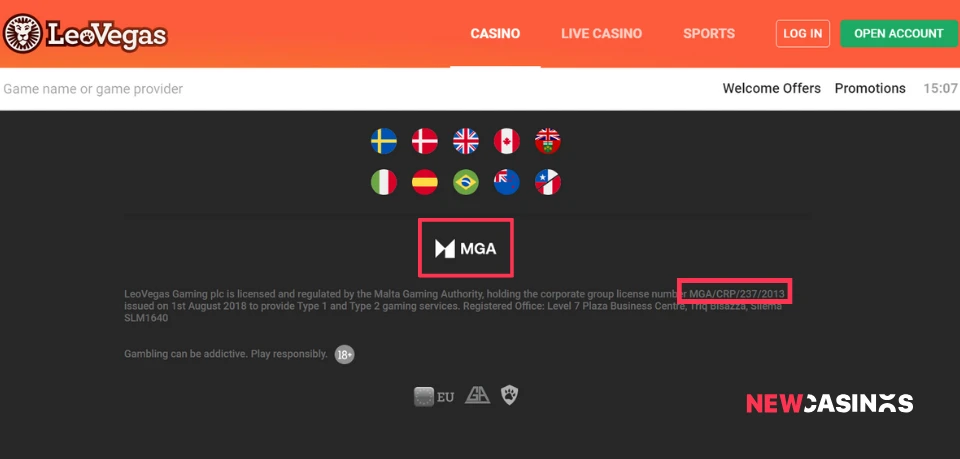
If there is any doubt regarding the authenticity of the MGA licence details shown on a gambling site, then it is advisable to check the official licensee register. Interested parties can search by licensee name, authorisation status, URL or Gaming Service at the official MGA website.
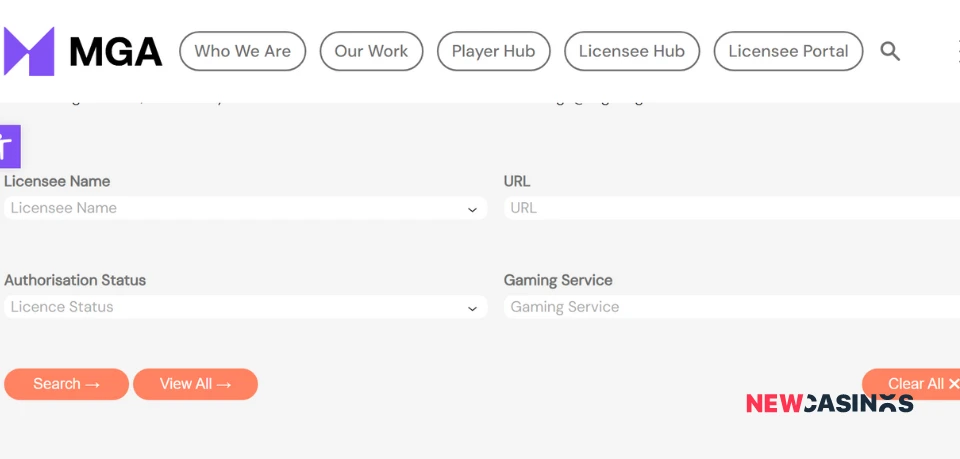
⚖️ Remember that we only ever recommend licensed casinos at NewCasinos, and on this very page, we have a list of the newest MGA casinos.
Advantages of the Malta Gaming Authority License
While doing our research, we noticed the 4 following advantages of having this license:
- With the gambling industry awash with unsafe and unlicensed websites, any operator holding an MGA licence can benefit greatly from the trusted status that it brings to their brand. Licenses granted in Malta are on a par with those issued in Gibraltar in covering players from countries that do not provide their own official gambling licences.
- From a financial perspective, the low gaming licence fees and taxes are a big draw for gaming providers in search of an EU base. The corporate income rate for businesses can be as low as 5%. The fact that gaming operators are only required to pay tax in Malta on revenue from Maltese customers is a massive boon for them.
- It also benefits gambling customers. They can play safely knowing that the MGA licence ensures the fairness of any games of chance via independent testing. With operators having to adhere to the strict guidelines around responsible gaming and fraud, players can feel protected by the MGA.
- In addition to this, the Malta Gaming Authority checks that any provider wishing to obtain a licence completely separates its player funds from the rest of its operating funds. This is very reassuring for players because if a new casino or sportsbook goes bust overnight, your funds should be safe.
Risks of the Malta Gaming Authority License
The following 3 risks are associated with this license:
- One of the biggest risks that the MGA faced was the country’s reputation regarding fraud and corruption. In recent years, there have been several high-profile incidents that have highlighted a mafia-style contingent operating within Malta. The MGA has sought to distance itself from these scandals but is still highly entwined with the government of Malta.
- Outside forces like the EU want to tighten anti-money laundering and financial services regulations. Any further changes in EU policy could dictate how long the MGA will be able to operate as a global gaming regulator.
- Other countries worldwide are already making moves to impose tighter regulations on their domestic markets, and sites that use the MGA licence could be prohibited.
Recent Legislative Changes
The Gaming Commercial Communications Regulations were drawn up by the Malta Gaming Authority in 2018. They are intended to provide greater clarity to operators who want to advertise their products and services to potential players.
The changes were intended to help operators promote their brands in a lawful, fair and responsible manner. They are intended to protect underage and vulnerable people from being exposed to the temptations of online gambling and giving operators a practical framework to stick to.
This also helps the public to understand what is and is not acceptable in the way casinos and other gambling outfits promote themselves. Giving this new clarity means that complaints can be resolved quickly where necessary.
Complaints Against the Malta Gaming Authority
Some critics of the MGA have suggested that it has been historically slow to follow up on complaints and investigate licence holders due to their thorough process and stringent checks in place. However, as regulations continue to tighten on gambling in many international markets, the Malta Gaming Authority is constantly making moves to improve its effectiveness. If players feel like they are being treated unfairly by an online gambling operator which holds an MGA license, then they can make a formal complaint. In most cases, they will suggest that a player attempts to resolve the dispute directly with the operator. If this fails, then the MGA may investigate the situation and look for a quick resolution.
How to Lodge a Complaint with MGA
For players who need help filing a complaint, complete these 5 steps:
- First of all, you should try resolving the issue straight with the casino
- If it’s not resolved, thoroughly complete the complaint form provided by MGA and provide all the necessary information about your issue.
- As an optional step, we recommend including a copy of your identification. (You might be asked for it anyway, so this will help speed up the process)
- Once everything has been submitted, keep an eye out for any additional information requested by the MGA to reach a verdict on the complaint.
- Wait for a final response; a decision is usually reached within 30 days.
Before filing the complaint, confirm that the MGA licenses the casino.
Contact Information
In the table below, we have provided all the relevant information when it comes to contacting this authority:
| Method | Information |
|---|---|
| info.mga@mga.org.mt | |
| ☎️ Telephone | +3562546 9000 |
| 📨 Address | Building SCM 02-03, Level 4, SmartCity Malta, Ricasoli SCM1001 |
| ⏲️Opening Hours | Mon – Fri: 09.00hrs till 17.00hrs (excluding Public Holidays) |
| ⭕ Others | FAQs |
MGA Casinos FAQs
Players may have questions about signing up and playing at MGA-licensed online casino and sportsbook sites. Here we will aim to tackle the most frequently asked questions around this specific online gaming licence.
What is the cost of a casino licence in Malta?
The fees for obtaining a licence to operate from the MGA is between €10,000 and €35,000, depending on the class and the annual revenue levels of the provider. There is an ongoing annual fee to renew the licence.
What is the game selection like at MGA licensed casinos?
The selection of games on offer will vary from one casino to the next. Some will have a massive range of online slots, live table games and jackpots while others might focus on bingo games. With a little searching, it’s not hard to find something to satisfy any taste or budget.
Are casino bonuses available at MGA licenced casinos?
Players can enjoy a wide range of bonuses at casinos licensed by the MGA on both sign-ups and as returning customers. Casino bonuses may come in the form of cashback, bonus cash, free spins or something else. The MGA does place regulations on the way the bonuses are offered and advertised. This is to help players know exactly what they are signing up for, including when it comes to any wagering requirements.
What is the minimum age to play at an MGA licensed casino?
To play at MGA licensed operators, players are required to be at least 18 years of age. When signing up with a casino or sportsbook provider, players will need to verify their age by providing an appropriate ID. Operators risk having their MGA licence revoked if they are found to be in breach of the age restrictions.
Can you play at MGA licensed casinos from outside Malta?
Yes. The MGA licences provide coverage for players who want to gamble in any jurisdiction which does not have local licensing authority. This can help to reassure players that they are protected and able to enjoy a safe and secure online gaming experience.
How can players self-exclude at an MGA licensed casino?
The MGA launched a consultation in 2019 to see if it is viable to launch a unified self-exclusion system in the country’s regulated gambling market. For the time being, it is stipulated that each licence holder needs to have its own self-exclusion system in place for players.
Are MGA licensed casinos safe to play at?
Licences issued by the MGA are among the most highly regarded in the world thanks to stringent checks and regulations they have in place. These checks are designed to keep players safe by ensuring providers are complying with the rules and regulations.



